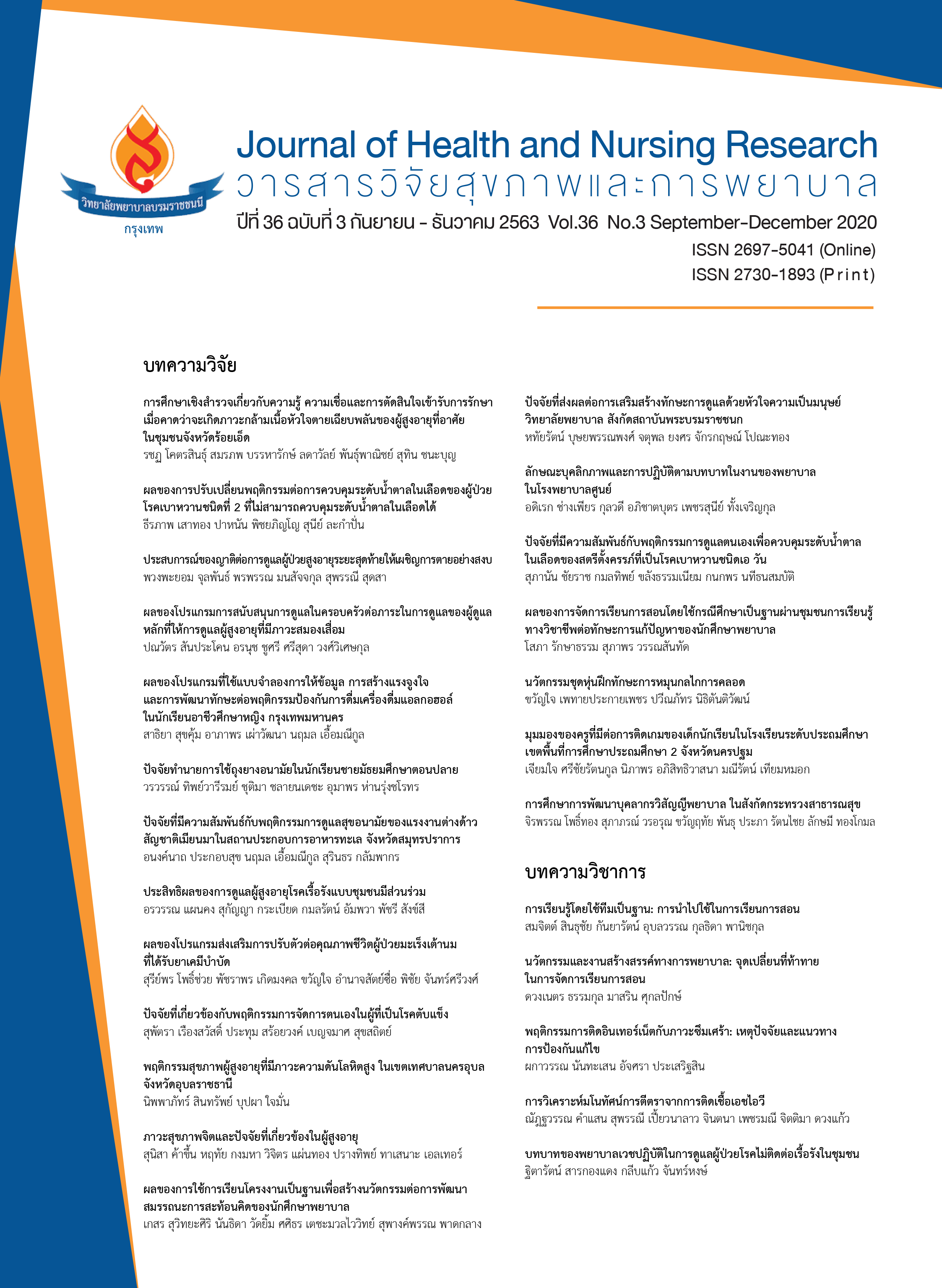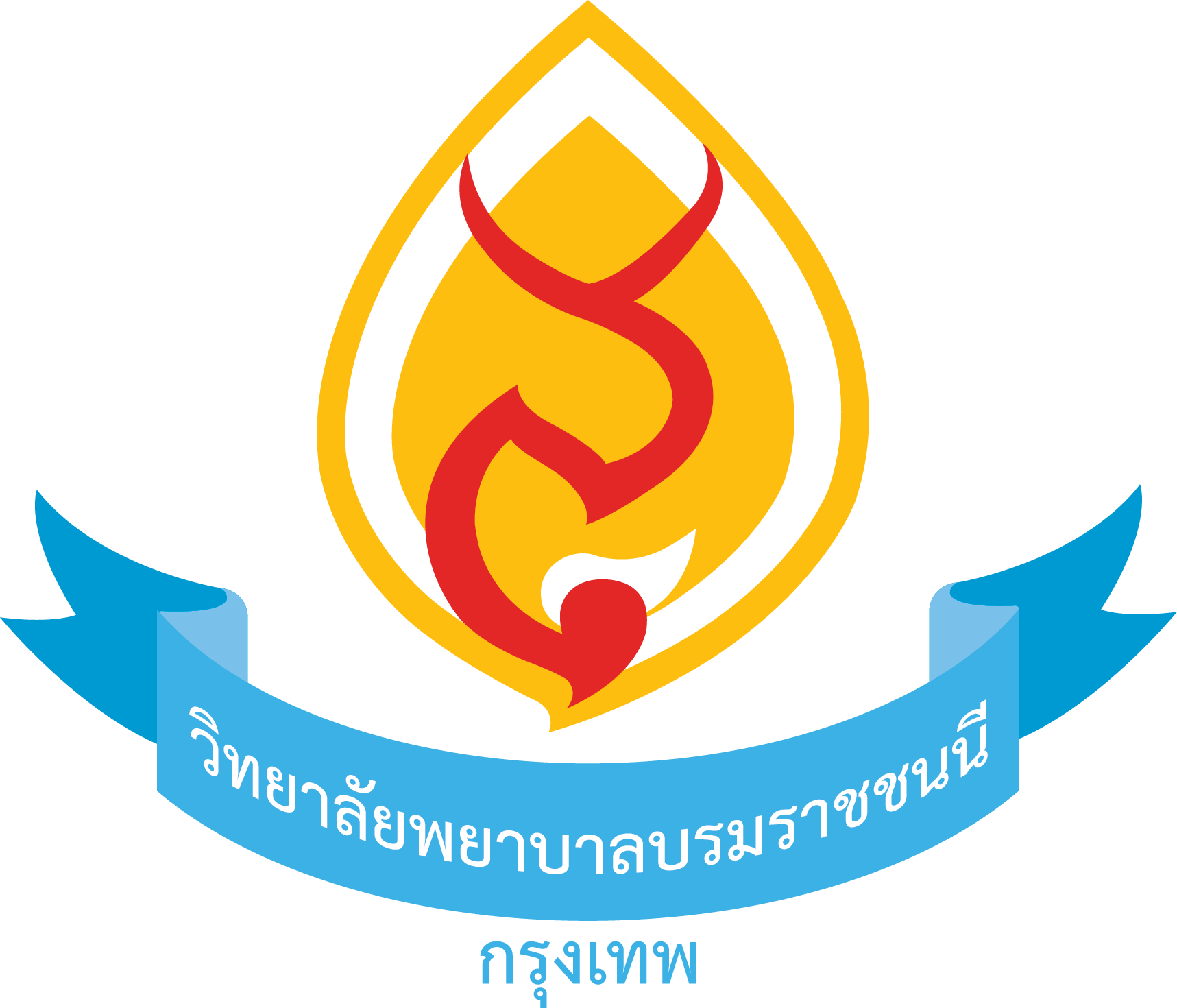Factors Affecting the Enhancement of Humanized Health Care Skills of Nursing Students at Nursing College, Praboromarajchanok Institute
Keywords:
humanized health care skills, humanized care, factors affecting to enhance humanized, health care skillsAbstract
This qualitative research aimed to study factors affecting to enhance humanize health care skills at Nursing College, Praboromarajchanok Institute. A purposive sampling approach was employed to ensure a robust set of data. These included a special focus on 25 volunteer experts from five college in five regions of Thailand whose academic article based on humanized health care skills, consisting of executive director, teachers and graduate students users from Nursing College, Praboromarajchanok Institute in 2019 academic year. All volunteers wishing to share their knowledge through 11 semi structure questions. Combining methods to analyzer qualitative data, content analysis and
tri-angulation, as a means to provide a deeper analysis of text was carried out by 1 executive director, 1 teacher and 2 graduate students users.
Results indicated that seven factors including curriculum, teacher, learner, teaching method, student affairs, learning facilities and evaluation affecting to enhance humanize health care skills. Teacher is most important factor because the teacher must assess the student all the time and
enhance and understand the parts that are lacking while learning facilities are the least important factor because it is only a teaching facility.
factor because it is only a teaching facility.
Downloads
References
2. Jomsri P. Perception of nursing principle in Thailand. Journal of Thai Journal of Nursing Council 2010;25(1):27-37. (in Thai).
3. Sungjang C. Let's return the heart to the health system. Mohanamai Journal 2009;4(1):22-3. (in Thai).
4. Wongkongkathep S. Evaluation of learners and integrated teaching.[Research report]. Nonthaburi:Praboromarajchanok Institute, 2007:50-1. (in Thai).
5. Charoensuk S, Autthohi P, Pethkong J, Chulert P, Kaewmeungphang R, Kullapanit M, et al. Take lessons from skills development, learning process to change the paradigm to create innovation of health and public health development with the role of coach in reflecting with 3 basket techniques.Bangkok:Danex intercorperation Ltd., 2019. (in Thai).
6. Kumthana P, Inthana J, Wongyara N, Hakom N, Jumnean M. Perception of humanize health care behavior of students, teachers, users graduates and clients Rachaburi.[Research report]. Rachaburi: Boromarajonani Nursing College, Rachaburi, 2010 (in Thai).
7. Krekchaiwan D, Klungrith S. A study of the effect of integrated instructional management in health promotion and illness prevention subject. In:Knowledge Management The First Series, Methnawin S, Siriwethsoonthorn A ,editors. Praboromarajchanok Institute academic conference 2010 Life is Education, Education is Life ;2010 Aug 25-26; Monthein Riverside Hotel. Nonthaburi: Thahanphansook Printer; 2010.p.89-102. (in Thai).
8. Wongyai W. Graduate curriculum administration[Internet]. 2017[ cited 2019 Jan 14]. Available from: https://nawaporn.files.wordpress.com ›2009/01. (in Thai).
9. Wongkongkhathep S. Think and do, do and think 2. Nonthaburi: Department of Thai Traditional and Alternative Medicine; 2016; 23-33.(in Thai)
10. Thipsungnoen T. A causal model of caring behavior of nursing students in boromarajonani college of nursing of praboromarajchanok institute for health workforce development [doctoral’s thesis].Nonthaburi: Sukhothaithumathiraj University;2019:279. (in Thai).
11. Praboromarajchanok Institute. A guide to proceeding to achieve praboromarajchanok graduate identity. Nonthaburi: Praboromarajchanok Institute; 2011;11-15. (in Thai).
12. Chueatong S, Krirkgulthorn T. The development of service mind and humanized care for nursing student. Journal of Nursing and Education 2018;11(4):1-13. (in Thai).
13. Bunnakit H, Yana A. The Learning outcomes of students from the integrated nutrition subject. In: Knowledge Management The First Series, Methnawin S, Siriwethsoonthorn A,editors.Praboromarajchanok Institute academic conference 2010 Life is Education, Education is Life; 2010 Aug 25-26; Monthein Riverside Hotel. Nonthaburi: Thahanphansook Printer; 2010. 8-15.(in Thai).
14. Karen L. Mc Camant. Humanistic nursing, interpersonal relations theory, and the Empathy-Altruism Hypothesis. Nursing Science Quarterly 2006;19(4):334-8.
15. Judy E, Duchscher B. Bending a habit: critical social theory as a framework for humanistic nursing education. Nurse Education Today 2000;20:453–62.
Downloads
Published
How to Cite
Issue
Section
License
Article published Is the copyright of the Journal of Health and Nursing Research (Boromarajonani College of Nursing, Bangkok) Cannot be republished in other journals


















